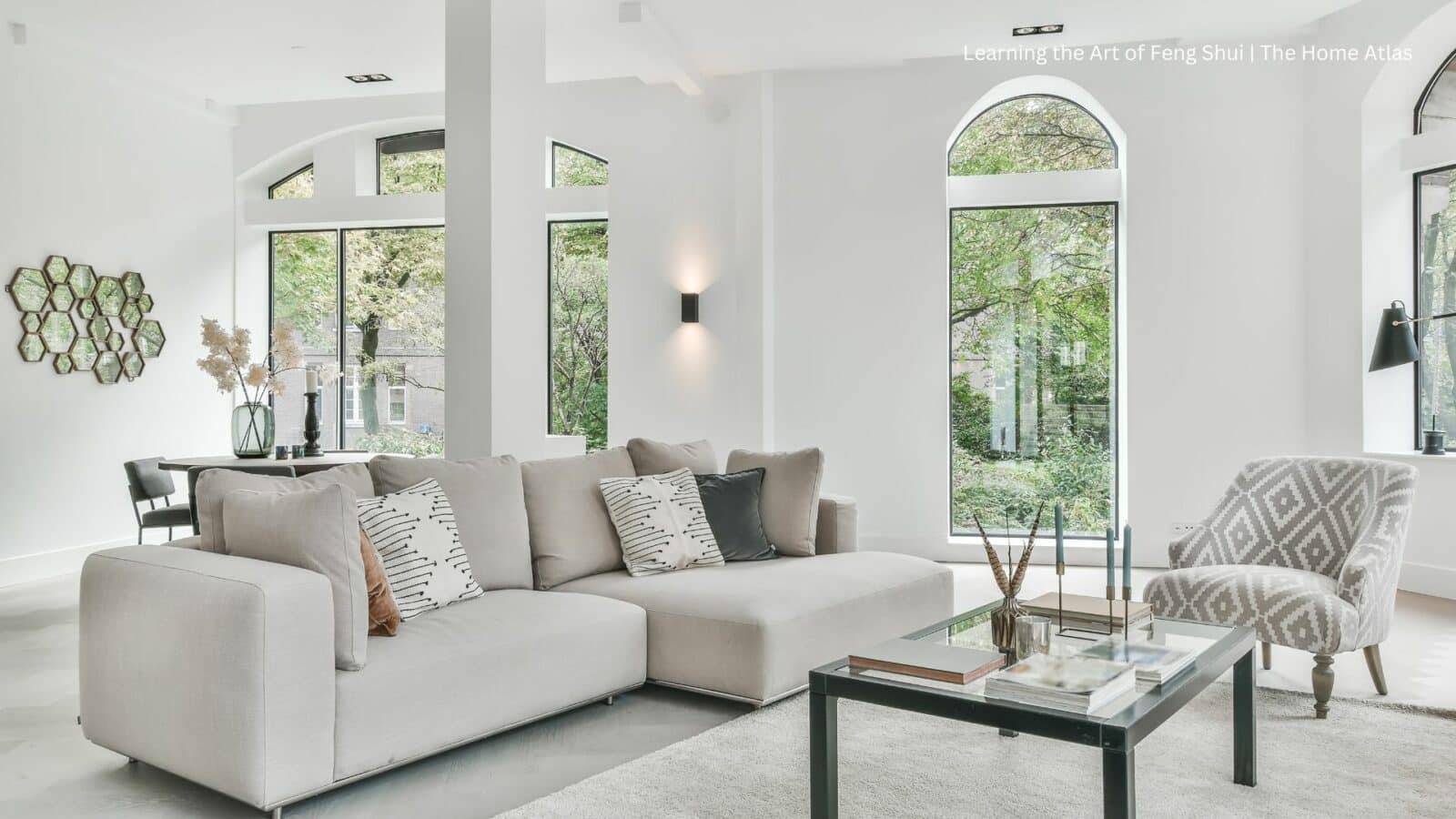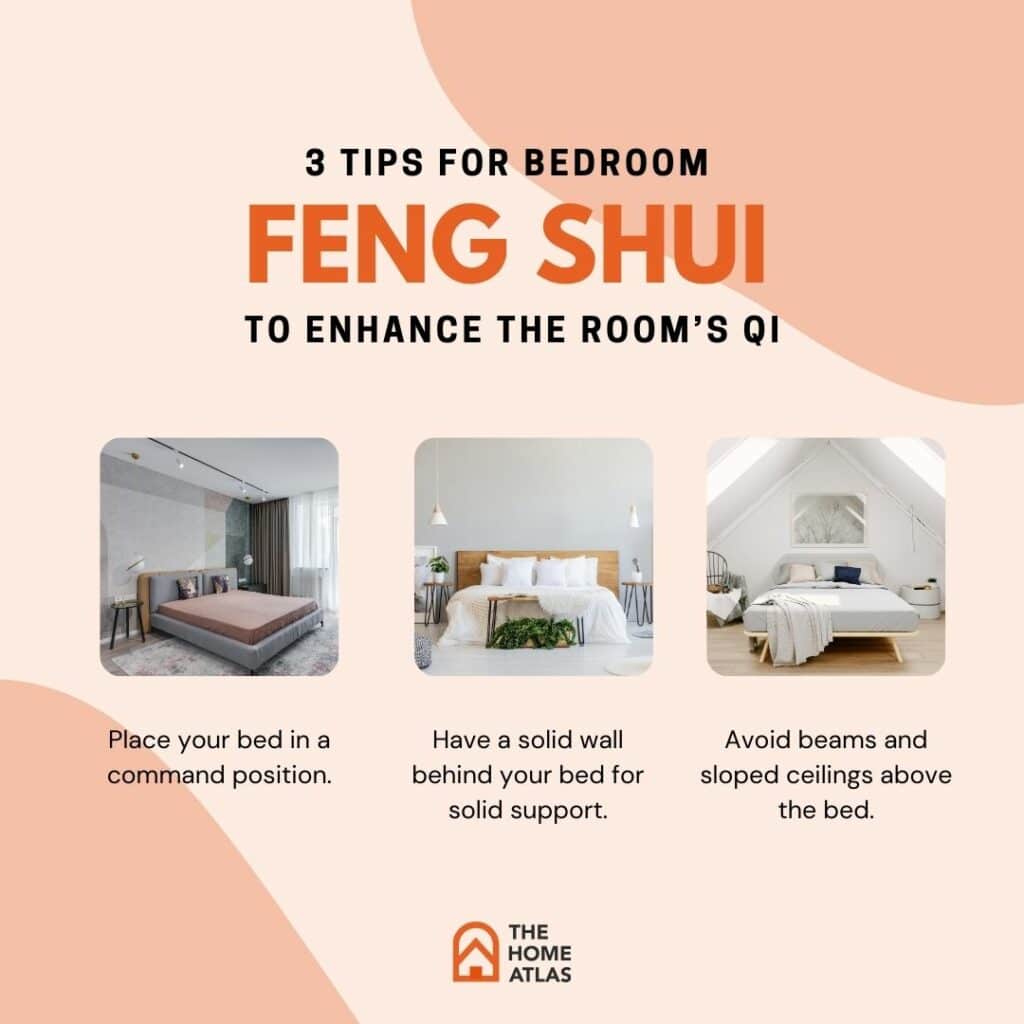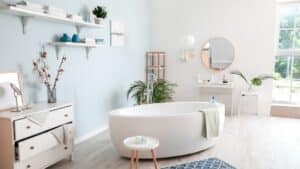Feng shui, an ancient Chinese art, harmonizes individuals with their surroundings. This guide explores feng shui’s power to create balance and positivity in your home. Discover room-by-room advice, essential principles, and practical tips to transform your space.

Fundamentals of Feng Shui
Feng shui operates on Qi or Chi, the Five Elements, and the Bagua map. These principles guide the arrangement of your home to foster balance. Learn how colors and directions influence energy flow, impacting well-being and prosperity.
Qi or Chi
Qi, the life force that flows through all things, is central to Feng Shui practice. Its smooth and unobstructed circulation within a space is believed to enhance health, wealth, and happiness.
The Five Elements
The Five Elements—wood, fire, earth, metal, and water—represent different types of energy and aspects of nature. Balancing these elements in a space can influence its vibe and the well-being of its inhabitants.
Bagua Map

The Bagua map, an eight-part grid, applies to your living space to define areas influencing various aspects of life, such as career, relationships, and health.
Feng Shui Through the Home: Room-by-Room Guide
Living Spaces: Enhancing Social and Family Harmony
Living room feng shui centers on inviting positive energy. Use vibrant colors to boost vitality and arrange furniture to encourage conversation. A thoughtful layout ensures a harmonious gathering space for friends and family.
- Clear the Clutter: Start by decluttering to enhance the flow of chi.
- Natural Light and Air: Emphasize large windows and ventilation to bring in energy.
- Balance the Five Elements: Incorporate wood, fire, earth, metal, and water through decor to create harmony.
- The Command Position: Place the main sofa against a solid wall with a view of the entrance.
- Circular Configurations: Use circular arrangements for furniture to support energy flow and conversation.
- Avoid Sharp Edges: Choose rounded furniture or use plants/fabrics to soften edges.
- Mirror Placement: Use mirrors to expand space and reflect positive aspects, avoiding clutter.
- Plants for Vibrancy: Add healthy green plants to symbolize growth, avoiding sharp-leaved plants.
- Calming Color Palette: Use neutral tones with accents of blue, green, or red to stimulate energy.
- Water Elements: Include fountains or aquariums, placing them in the north or southeast, and maintain them well.
Feng Shui Living Room Layout
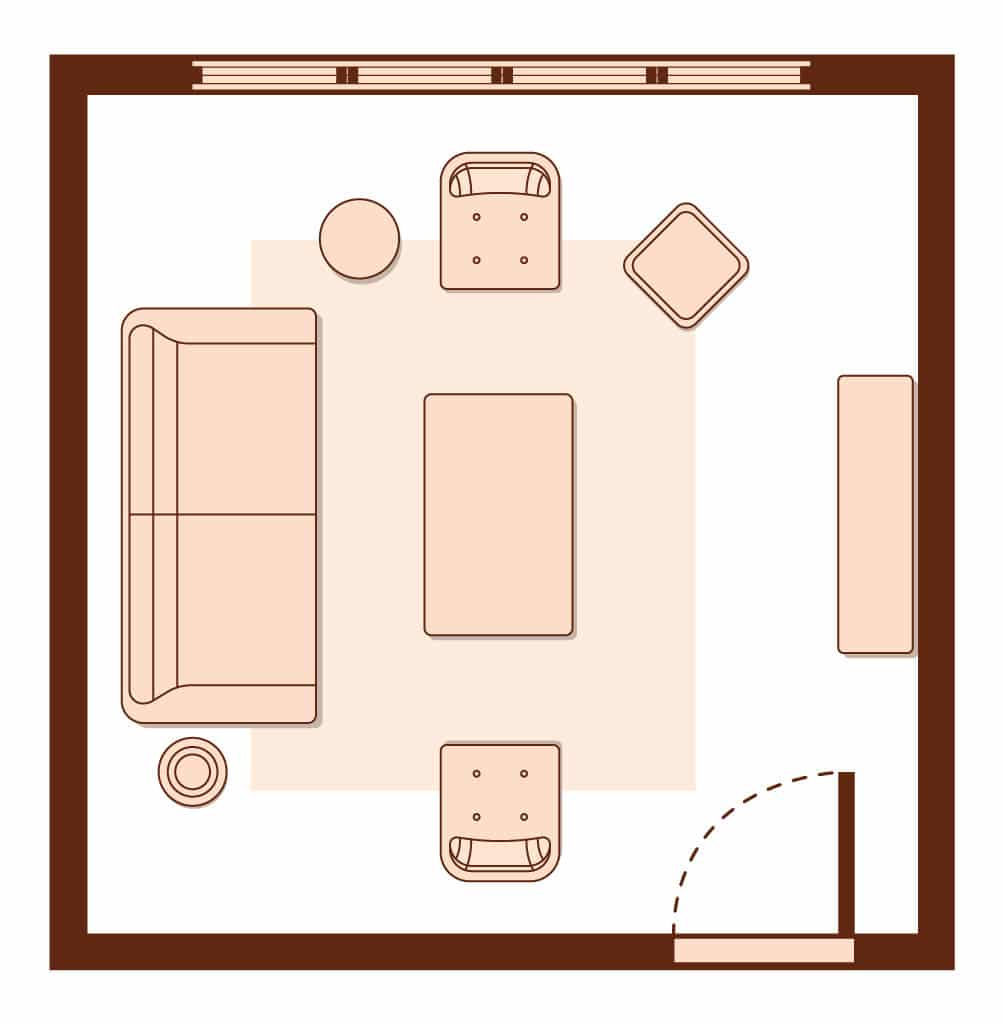
Here are key points for creating a Feng Shui living room that promotes love and positive energy:
- Promote Harmony and Balance: Arrange furniture to create a harmonious flow of energy, ensuring a clear path for movement.
- Harmonious Furniture Layout: Position furniture to encourage ease of movement and facilitate conversation, avoiding energy blockages.
- Sofa Placement: Place the sofa to support good energy flow and comfortable interaction, making it a focal point for positive vibes.
- Importance of Lighting: Use a mix of lighting types to foster a warm, welcoming environment that enhances the room’s energy.
- Accessorize Thoughtfully: Choose accessories that elevate the room’s positive energy, such as plants, artwork, and symbols of love, to support a loving atmosphere.
Restful Retreats: Bedroom Feng Shui
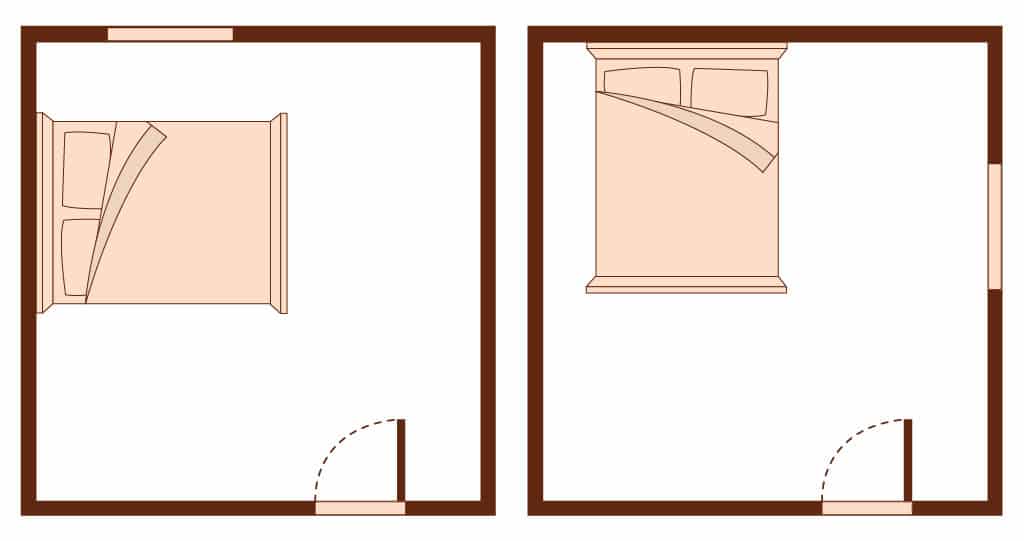
A serene bedroom layout supports relaxation and rejuvenation. Position your bed in the command position for safety and strength; avoid placing mirrors facing the bed to ward off restlessness. These tweaks promise a more peaceful sleep environment.
Bedroom Mirror Tips
- Placement of Mirrors: Mirrors should not face the bed directly to avoid negative energy and sleep disruption. Placing mirrors on adjacent walls or closet doors is preferred.
- Size of Mirrors: The mirror size should complement the room and furniture size, with large mirrors adding spaciousness and small mirrors enhancing coziness.
- Style of Mirrors: Mirror frames should be simple and elegant, aligning with the room’s overall décor to maintain aesthetic harmony.
- Reflections in Mirrors: Mirrors should reflect calming and positive elements, avoiding clutter or negative aspects of the room to promote tranquility.
- Number of Mirrors: Limiting the number of mirrors to two or three is advised to prevent negative energy and sleep disturbances.
Nourishing Spaces: Kitchen and Dining Feng Shui
The kitchen thrives on organization and welcoming colors. Positioning your stove and sink harmoniously ensures a nourishing space. Embrace natural light and declutter countertops for a balanced kitchen.
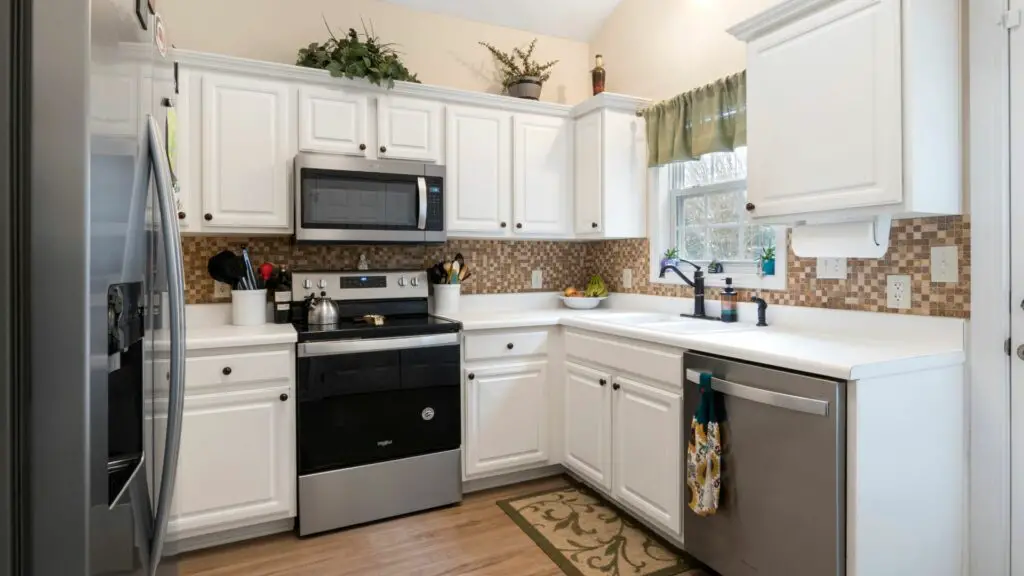
- Feng Shui Kitchen Balance: Incorporate the five elements and maintain a clutter-free space for positive energy flow.
- Stove Placement: Place against a solid wall for stability, avoiding positioning where the cook’s back faces an entry or window.
- Sink and Stove Harmony: Position on opposite sides to avoid elemental clash between water and fire, ensuring kitchen harmony.
- Optimal Kitchen Location: Avoid facing the front door or under a bedroom to prevent energy disruption and health issues; align with the house’s Bagua for better Chi.
Serene Sanctuaries: Bathroom Feng Shui
In feng shui, bathrooms need careful consideration to maintain energy. Use soothing colors and keep the door closed to prevent energy drain. Introduce plants to purify the space and enhance positive vibes.
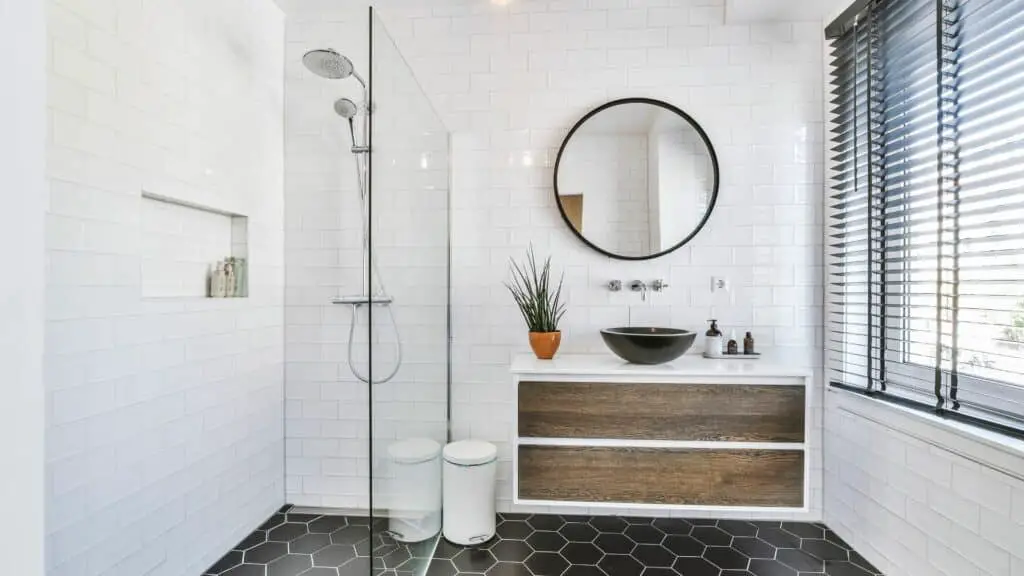
- Choose Calm Colors: Use earth tones, green, and white in the bathroom for stability, healing, and purity.
- Mind the Location: Avoid having the bathroom in the center of the home, facing a bedroom, or above the kitchen.
- Keep Energy In: Always close the bathroom door and toilet lid to prevent energy loss.
- Clean and Clutter-Free: Maintain cleanliness and minimize clutter for positive energy.
- Add Life and Light: Use plants and mirrors to add vitality and reflect positive aspects, not the toilet.
- Balance the Elements: Incorporate wood (plants/accessories), fire (candles/red towels), earth (tiles/stone), metal (fixtures/frames), and water carefully.
- Toilet Placement Matters: Don’t place the toilet facing or directly opposite the entrance. North or East-facing toilets are better for growth and health.
Productive Workspaces: Home Office Feng Shui
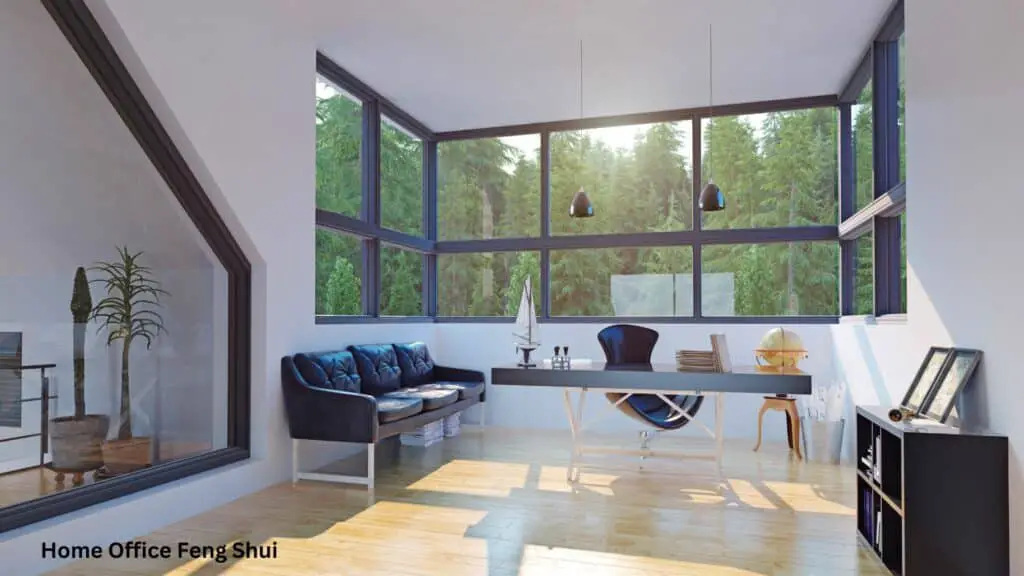
Desk Positioning for Success
Place your desk in the “command position,” which means facing the door but not directly in line with it. This positioning allows you to see who enters, offering a psychological advantage and inviting positive energy. Ensure your back is to a solid wall for support, avoiding windows behind you to minimize distractions and maintain focus.
Clutter-Free and Organized Space
Keep your home office organized and free from clutter. A tidy workspace promotes a clear mind and enhances productivity. Use storage solutions to keep important documents and tools within reach but out of sight. A clean desk fosters an environment where energy can flow freely, reducing stress and boosting creativity.
Incorporate Natural Elements for Balance
Balance the five elements of feng shui—wood, fire, earth, metal, and water—in your office to harness their energies. Wood can be introduced through plants, which also improve air quality; fire can be represented by using warm colors or a small lamp; metal accents like frames or sculptures can promote clarity; earth elements, such as ceramics, stabilize; and water features, like a small fountain, encourage calm and inspiration. Balancing these elements creates a harmonious and productive workspace.
Harmonizing External Factors: House Facing East

- Sunlit Start: An east-facing house greets you with morning sunlight, symbolizing health, harmony, and prosperity.
- Balance Energies: To handle the ample sunlight, introduce elements that create a peaceful atmosphere.
- Vibrant Entrance: Use plants or water features at the entrance to welcome positive energy.
- Color Choices: Opt for greens and blues to enhance the positive vibe; avoid reds and metallic colors that clash with the wood element.
- Bagua Focus: For east-facing homes, concentrate on the Zhen section of the bagua map with green color and wooden décor for growth.
- Front Door Colors: Use colors related to wood and water elements like olive or navy for the front door to set a positive energy tone.
- Decorate Outdoors: Embellish the porch with wooden details and wavy patterns to complement the home’s feng shui.
- Water Fountain: Place a fountain to the left of your front door (from the inside view) to boost positivity, but not to the right.
- Embrace Light and Shadow: An east-facing home should balance sunlight with mindful and creative decoration for optimal energy.
Feng Shui Tips
Feng shui makes every home space more harmonious and joyful. Here are some easy tips to maintain it:
Declutter Regularly
Clutter disrupts the flow of positive energy, known as chi, in your home. Regularly decluttering helps to create a calm and organized environment.
Balance Yin and Yang
Feng Shui is all about balance, so aim for a harmonious blend of yin (calm, passive energy) and yang (energetic, active energy) in each room.
Use Natural Elements
Incorporate natural elements, such as plants, stones, and wood, to bring balance and tranquility to your home.
Pay Attention to Entryways
The entrance to your home is a crucial element as it sets the tone for the entire space. Ensure it is well-lit, clean, and free of obstacles.
Enhance with Color
Color plays a big role in Feng Shui, as different colors are associated with different elements and energies. Choose colors that align with your goals and desired moods.
Arrange Furniture Strategically
Furniture placement can have a significant impact on the flow of energy in a room. Avoid blocking doorways and arrange furniture in a way that promotes open communication and flow.
Incorporate Symbols of Abundance
Display symbols of abundance and prosperity, such as images of water, coins, or bamboo, to attract positive energy and promote prosperity.
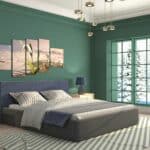
FAQ Section
What is a feng shui house?
A feng shui house aligns with ancient principles to harmonize its inhabitants with their environment. It uses strategic layouts, colors, and materials to optimize energy flow.
Which feng shui is best for home?
The best feng shui for a home depends on its layout and the occupants’ needs. Generally, a balance of the Five Elements and a clear Bagua map guide creates harmonious spaces.
How do I create feng shui in my home?
Start by decluttering and incorporating the Five Elements. Use the Bagua map to enhance key areas of your life. Position furniture and mirrors thoughtfully to promote positive energy flow.
What is the best house position for feng shui?
The best position is one that receives ample natural light, preferably facing east to welcome the morning sun. The home should also back against a solid support for protection and stability.
